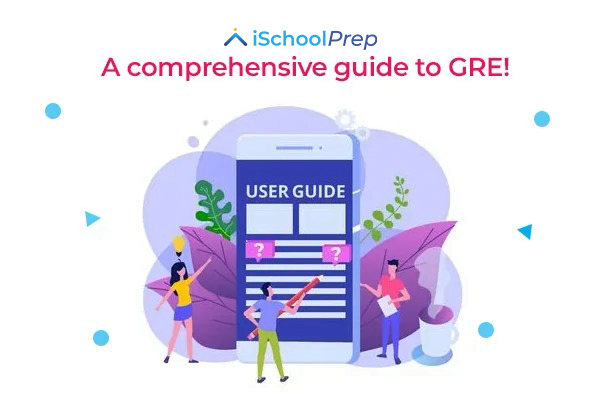Table of Contents
- GRE | An overview of the exam
- A little more about GRE
- Requirements for answering the GRE test
- Graduate Record Examination fees
- What are test sections available in the GRE?
- GRE test syllabus
- Topics in the GRE syllabus
- Question pattern and structure of the test
- Getting top scores on your test
- What are the GRE changes starting September 2023?
- Best study materials for the exam
- Key takeaways
- FAQs
GRE | An overview of the exam
The GRE or Graduate Record Examination is considered one of the important tests for individuals who want to take part in foreign universities’ business school and graduate school application process. It is a computer-based, multiple-choice examination for admissions to the topmost universities.
The business and graduate schools will look at your test score, academic records, and other achievements before approving your admission to a particular academic study.
A little more about GRE
GRE scores are accepted in many countries, including Germany, Canada, the U.K., and the U.S. Students worldwide are eligible to take the GRE in their native countries.
Many colleges and universities have included a specific GRE score as their qualification criteria. Multiple prestigious universities also ask for the candidate’s test score before the university authority can admit the applicant into the university’s Ph.D. and M.S. programs.
Due to the pandemic, many students could not be physically present during the exam, so ETS, the governing body of the GRE test, introduced the online mode for taking the test.
Requirements for answering the GRE test

If you want to take the test, remember that you must complete your undergraduate program successfully. ETS has developed this computerized English proficiency test for anyone willing to pursue further studies in different countries.
You can give the test any time of the year but with some specific conditions such as:
- You can appear for the GRE once every 21 days.
- Individuals can take this exam a maximum of 5 times each year.
- The university will consider your best GRE score if you appear multiple times.
- Once your test scores are out, they will have five years of validity.
- If any particular region cannot offer a computer-based test, candidates from that region can appear for a paper-based test only three times yearly.
Graduate Record Examination fees
The GRE fees in India are around Rs. 15,857/-, which is roughly 213 US dollars. While booking for the test, you will have to pay the exam fees. Also, remember that the exam fees can change according to your location.
ETS, as a matter of fact, offers financial help to economically weak students. There is a fee reduction or fee waiver program for which you must fill out a fee waiver form. After you have completed filling the details in the form, you can send it to the ETS, and the organization will communicate with you.
What are test sections available in the GRE?
Candidates appearing for the test will have to score well in three sections, namely –
- Quantitative reasoning
- Analytical writing
- Verbal reasoning
For the quantitative reasoning and verbal reasoning sections, the score is measured on a scale of 130 to 170. On the other hand, the total score for analytical writing is only 6.
GRE test syllabus
Analytical writing
With the help of the analytical writing section of the test, the applicant’s ability to understand complex concepts and ideas can be evaluated. Furthermore, the test will showcase the candidate’s ability to support their claim and discuss relevant ideas along with their standard English writing technique.
Verbal reasoning
The verbal reasoning section intends to measure the applicant’s ability to analyze and arrive at a conclusion by overseeing incomplete information and discourse.
Quantitative reasoning
In the quantitative reasoning section, the candidate’s mathematical skills are tested. Everything you’ve learned in school is tested here, from the basic sections to a little more complex ones.
Topics in the GRE syllabus
| Section of the syllabus | Topics included |
| Verbal reasoning | Verb tense, Noun, Pronoun, Adjective, Subject-verb agreement, Idiomatic expressions and idioms, Modifiers, Parallelism, Pronoun agreement, etc. |
| Quantitative reasoning | Percentage, Simple and compound interest, Sets theory, Probability, Ratio and proportion, Pipes, cisterns, work, time, speed, distance, and time, Geometry and Coordinate Geometry, Statistics, etc. |
Question pattern and structure of the test
Before you appear for the exam, you need to be aware of the question pattern and structure of the GRE test. The whole of the GRE test is classified into a total of 6 parameters: two quantitative aptitude test sections, one writing section, one experimental section, and two verbal sections.
First comes the writing section, which has two types of tasks. The first one is an argument task, and the other one is an issue task. In both the verbal sections, there are 40 questions and a time limit of 60 minutes (20 questions in each section). This section also includes questions like reading comprehension, text completion, and sentence equivalence.
On the other hand, the quant sections comprise 20 questions each and a time limit of 35 minutes for each section. The total score on the GRE is 340.
Getting top scores on your test

Here are a few do’s and don’ts that you need to remember –
- Getting a top score on the GRE test is impossible without a proper mindset. So, first of all, the aspirant must be mindful of their strong and weak areas and be ready to pursue the complex concepts in advance.
- One thing to remember here is that although many things can lead to lower scores in the GRE, knowing exactly where problem areas lie can help you improve your score. Therefore, look at the mock test papers beforehand and check which sections need constant revision.
- To boost your confidence for the final GRE test, keep regularly practicing so that on the test day, you save time and quickly solve questions that you have been consistently practicing.
- Carving out a definite study schedule after drawing a timetable is crucial to cover all the topics before the exam date efficiently.
- Don’t forget that only you are responsible for maximizing your potential. So, no matter how tedious the process or problematic the curriculum appears, you can ace the GRE test with hard work and consistency if you have the will to score well.
What are the GRE changes starting September 2023?
On 22nd September 2023, a new shorter format for the GRE tests will be introduced. This format will continue to test the verbal and quantitative reasoning skills, critical thinking, and analytical skills of the applicant. The duration of the GRE is the most significant change of the new format. The exam which was previously 3 hours and 45 minutes long will be reduced to 1 hour and 58 minutes long. To reduce the time there will be a change in the overall structure of the exam.
| Section | Structure | Questions | Time estimated |
| Analytical writing | 1 section | 1 essay | 30 mins |
| Quantitative reasoning | 2 sections | 27 questions | 47 mins |
| Verbal reasoning | 2 sections | 27 questions | 41 mins |
The waiting time for GRE test scores has also been reduced and students can expect their results in a period of 8-10 days. It previously took 10-15 days to get the scores. The ETS will announce practice tests of 2 hours in the month of September.
The question being removed from the test are-
- Argumentative essay
- Experimental or uncensored section.
- Reduction of questions from 40 to 27 in the Quantitative and Verbal sections.
- 10-minute break.
Best study materials for the exam
Although preparation can be done from online mock tests and books, we have curated a list of the best study materials that will help you prepare for the examination. Some of these are –
- Barron’s new GRE (19TH EDITION)
- Barron’s Verbal Workbook
- ETS Official GRE Guide (2nd Edition)
- Barron’s Math Workbook
- Kaplan GRE Premier/ New GRE: Strategies, Practice & Review
Key takeaways
- The Graduate Record Examination is a testing method through which you can enter your dream university or college to pursue higher education (master’s and Ph.D.).
- Even if you don’t have any specific foreign university in your mind, with better test scores, your probability of getting admission to a top university will significantly increase.
- As a matter of fact, for the graduate record examination, self-study should suffice.
- However, to score better, you should take assistance from any online platform that offers resources and lessons on how to score well on the test.
- These online platforms can help you achieve the same if you want to get into prestigious universities.
If you are preparing for exams to study abroad, get in touch with us today!
Liked this blog? Then read, IELTS band score | Details you must not miss out on!
FAQs
Question 1: Are you allowed to take the GRE after graduation?
Answer: Although you are allowed to take the test after graduation, attempting it in the first year of your undergraduate program is recommended.
Question 2: How many times can you attempt the GRE in a year?
Answer: Usually, you can attempt the test up to 5 times a year and 21 days apart from the previous test day.
Question 3: Will you receive the scores immediately after the test?
Answer: Your official score will become available 10 to 15 days after you attempt the test.






